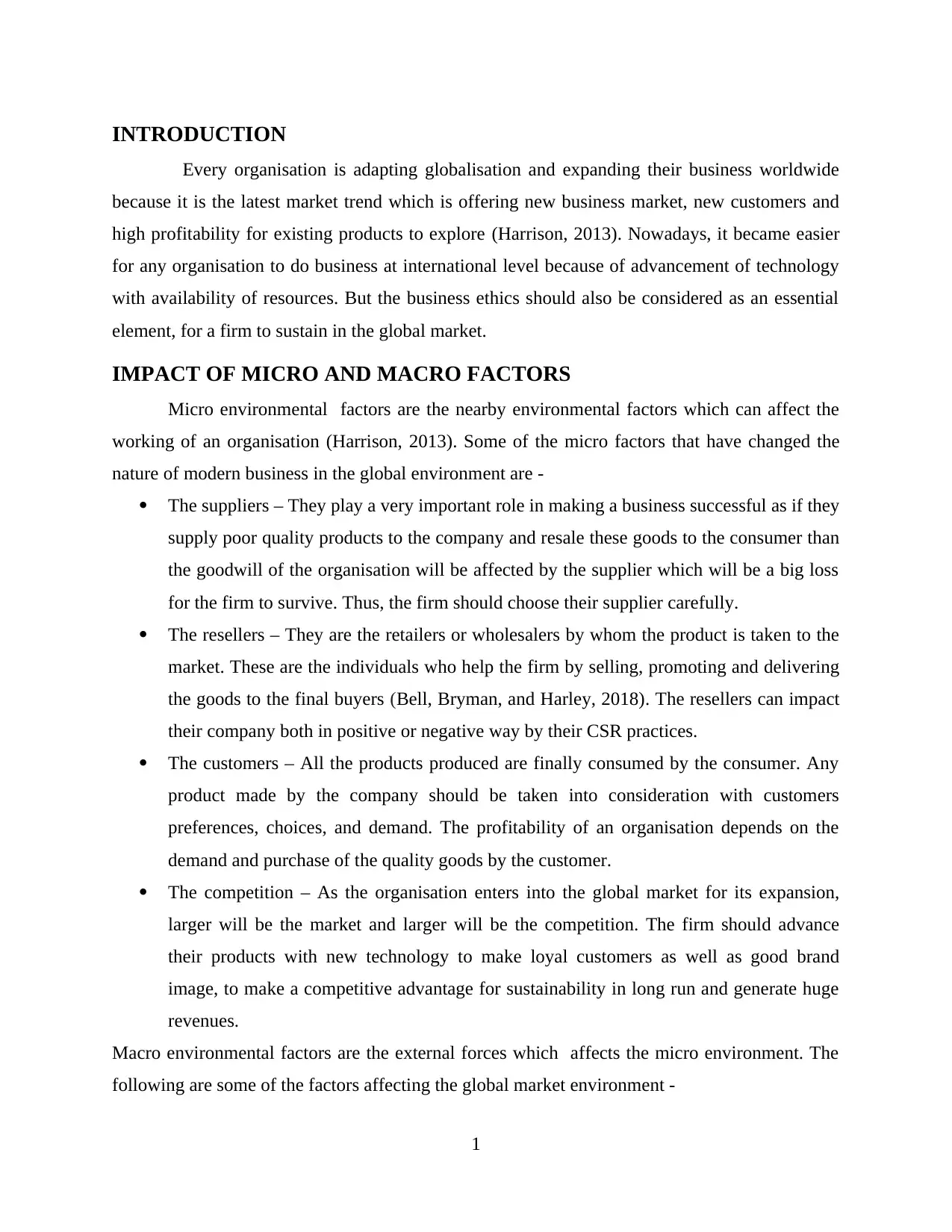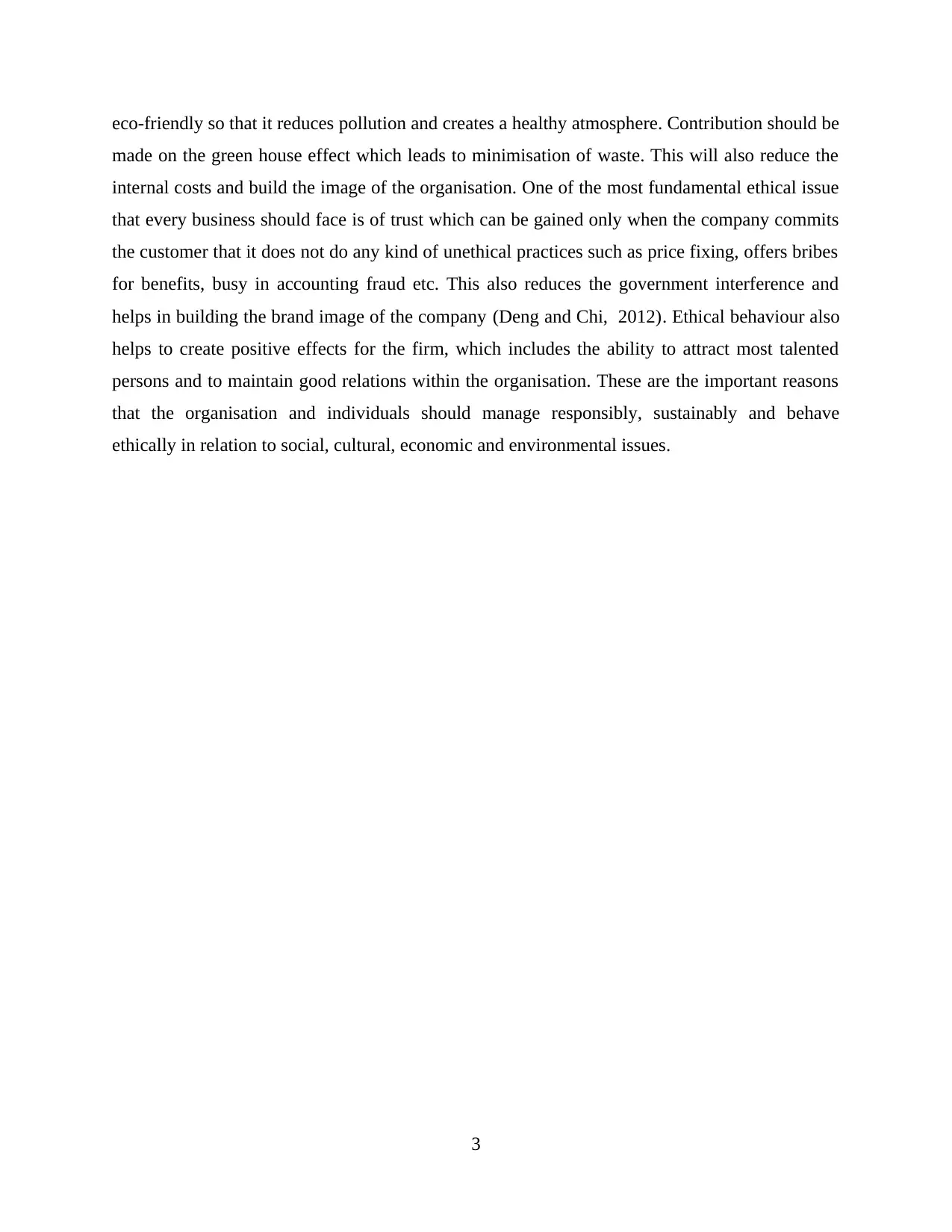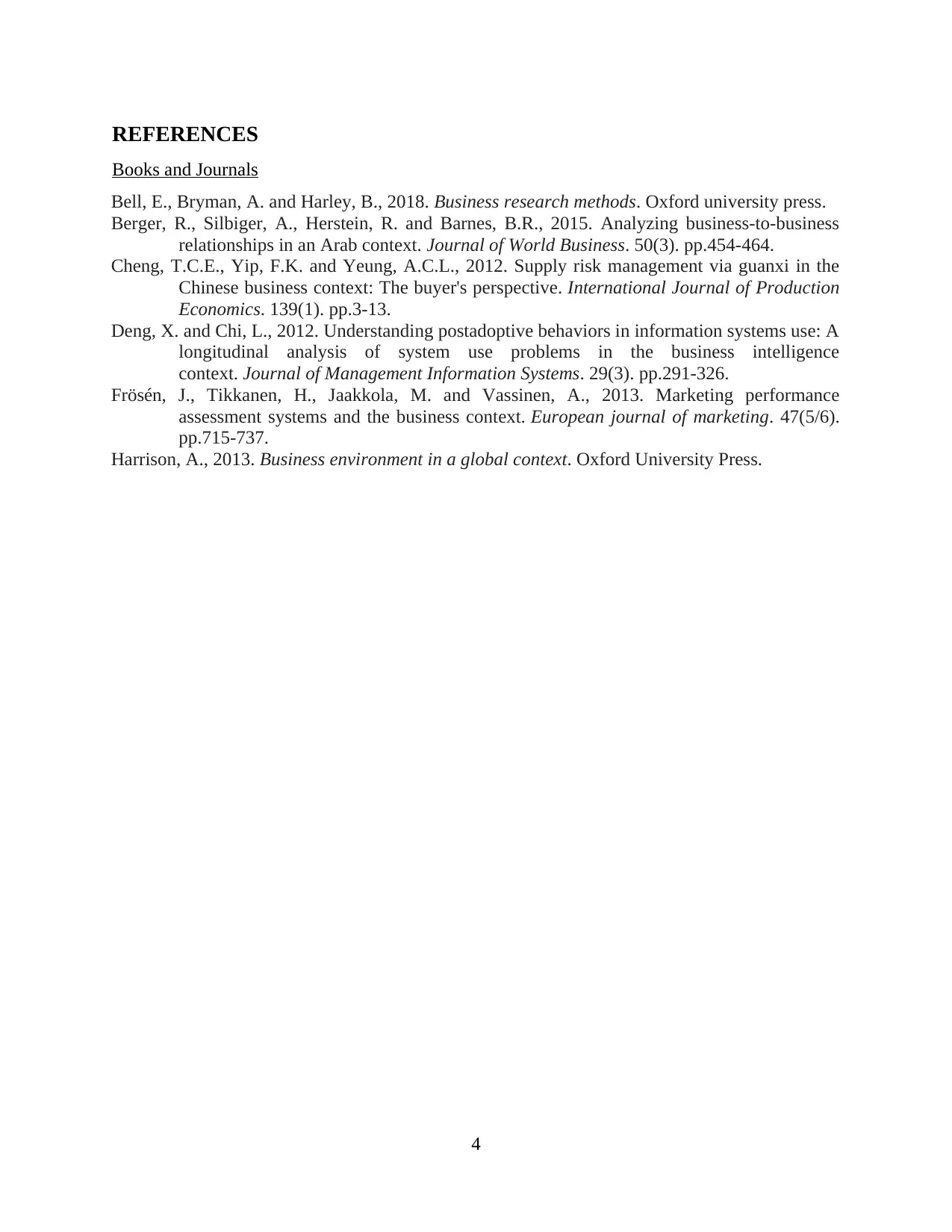Analysis of Business Environment Factors and Ethics
VerifiedAdded on 2021/01/08
|6
|1254
|109
Report
AI Summary
This report provides an analysis of the business environment, focusing on the impact of micro and macro factors. It explores how suppliers, resellers, customers, and competition shape modern business within the micro-environment. The report also examines technological, demographic, and economic factors as macro-environmental influences. Furthermore, it delves into the importance of ethical behavior in relation to social, cultural, and economic issues, emphasizing the significance of trust, fair practices, and eco-friendly approaches for sustainable business practices. The report concludes by highlighting the essential role of ethical conduct in fostering positive relationships and attracting talent within organizations operating in a globalized market.

Context of Business
Paraphrase This Document
Need a fresh take? Get an instant paraphrase of this document with our AI Paraphraser

Table of Contents
INTRODUCTION...........................................................................................................................1
IMPACT OF MICRO AND MACRO FACTORS..........................................................................1
ETHICAL BEHAVIOUR IN RELATION TO SOCIAL, CULTURAL AND ECONOMICAL
ISSUES............................................................................................................................................2
REFERENCES................................................................................................................................4
INTRODUCTION...........................................................................................................................1
IMPACT OF MICRO AND MACRO FACTORS..........................................................................1
ETHICAL BEHAVIOUR IN RELATION TO SOCIAL, CULTURAL AND ECONOMICAL
ISSUES............................................................................................................................................2
REFERENCES................................................................................................................................4

INTRODUCTION
Every organisation is adapting globalisation and expanding their business worldwide
because it is the latest market trend which is offering new business market, new customers and
high profitability for existing products to explore (Harrison, 2013). Nowadays, it became easier
for any organisation to do business at international level because of advancement of technology
with availability of resources. But the business ethics should also be considered as an essential
element, for a firm to sustain in the global market.
IMPACT OF MICRO AND MACRO FACTORS
Micro environmental factors are the nearby environmental factors which can affect the
working of an organisation (Harrison, 2013). Some of the micro factors that have changed the
nature of modern business in the global environment are -
The suppliers – They play a very important role in making a business successful as if they
supply poor quality products to the company and resale these goods to the consumer than
the goodwill of the organisation will be affected by the supplier which will be a big loss
for the firm to survive. Thus, the firm should choose their supplier carefully.
The resellers – They are the retailers or wholesalers by whom the product is taken to the
market. These are the individuals who help the firm by selling, promoting and delivering
the goods to the final buyers (Bell, Bryman, and Harley, 2018). The resellers can impact
their company both in positive or negative way by their CSR practices.
The customers – All the products produced are finally consumed by the consumer. Any
product made by the company should be taken into consideration with customers
preferences, choices, and demand. The profitability of an organisation depends on the
demand and purchase of the quality goods by the customer.
The competition – As the organisation enters into the global market for its expansion,
larger will be the market and larger will be the competition. The firm should advance
their products with new technology to make loyal customers as well as good brand
image, to make a competitive advantage for sustainability in long run and generate huge
revenues.
Macro environmental factors are the external forces which affects the micro environment. The
following are some of the factors affecting the global market environment -
1
Every organisation is adapting globalisation and expanding their business worldwide
because it is the latest market trend which is offering new business market, new customers and
high profitability for existing products to explore (Harrison, 2013). Nowadays, it became easier
for any organisation to do business at international level because of advancement of technology
with availability of resources. But the business ethics should also be considered as an essential
element, for a firm to sustain in the global market.
IMPACT OF MICRO AND MACRO FACTORS
Micro environmental factors are the nearby environmental factors which can affect the
working of an organisation (Harrison, 2013). Some of the micro factors that have changed the
nature of modern business in the global environment are -
The suppliers – They play a very important role in making a business successful as if they
supply poor quality products to the company and resale these goods to the consumer than
the goodwill of the organisation will be affected by the supplier which will be a big loss
for the firm to survive. Thus, the firm should choose their supplier carefully.
The resellers – They are the retailers or wholesalers by whom the product is taken to the
market. These are the individuals who help the firm by selling, promoting and delivering
the goods to the final buyers (Bell, Bryman, and Harley, 2018). The resellers can impact
their company both in positive or negative way by their CSR practices.
The customers – All the products produced are finally consumed by the consumer. Any
product made by the company should be taken into consideration with customers
preferences, choices, and demand. The profitability of an organisation depends on the
demand and purchase of the quality goods by the customer.
The competition – As the organisation enters into the global market for its expansion,
larger will be the market and larger will be the competition. The firm should advance
their products with new technology to make loyal customers as well as good brand
image, to make a competitive advantage for sustainability in long run and generate huge
revenues.
Macro environmental factors are the external forces which affects the micro environment. The
following are some of the factors affecting the global market environment -
1
⊘ This is a preview!⊘
Do you want full access?
Subscribe today to unlock all pages.

Trusted by 1+ million students worldwide

Technological factors – In the modern world, the future of all businesses are shaped by
the technology. Nowadays, in every organisation, the use of human labour is decreased
with an increase in the use of machines. Business rely on smart machines for better
output of work. Every activity of business is automated nowadays which leads in
boosting sale and increase in profit (Berger, Silbiger, Herstein and Barnes, 2015).
Customer focus on Online shopping and e-payment method for their ease, which is also a
part of technology. Thus, it is an essential factor for the fast growth of business.
Demographical factors – These refers to the study of human population with regards to
their size, gender, location, age and occupation. The demographic force helps in the
division of the population into target markets and market segments. There are many
customers in the global market with different age group who have their own choices and
this factor will help in deciding which product will attract which segment of the market
(Frösén, Tikkanen, Jaakkola and Vassinen, 2013). With this marketing plan, the
company will serve the right customers with right product and this will increase
consumer satisfaction and the firms profitability.
Economical factors – Demand and supply, inflation, recession etc. are the economic
factors which has an impact on business. Every company wants to flourish and maximise
their profits, all these can be achieved by the study of consumers demand and supply and
production process. The goods and services rendered should be cost effective and of high
quality to satisfy every customer which leads to a successful business.
Thus, both the micro and macro factors has a vital impact on modern business environment in
changing its nature.
ETHICAL BEHAVIOUR IN RELATION TO SOCIAL, CULTURAL AND
ECONOMICAL ISSUES
The social environment constitutes of expectations, attitudes, beliefs, and customs of
people in a society. Every organisation should give importance to the social environment while
manufacturing a product (Cheng, Yip and Yeung, 2012). The goods should satisfy the need and
demand of the customer to serve the society in a better way. It should be cost effective which
gives an opportunity to every segment consumer to make purchase decision. Fair market
practices in terms of price should be applied in the business. Products and services should be
2
the technology. Nowadays, in every organisation, the use of human labour is decreased
with an increase in the use of machines. Business rely on smart machines for better
output of work. Every activity of business is automated nowadays which leads in
boosting sale and increase in profit (Berger, Silbiger, Herstein and Barnes, 2015).
Customer focus on Online shopping and e-payment method for their ease, which is also a
part of technology. Thus, it is an essential factor for the fast growth of business.
Demographical factors – These refers to the study of human population with regards to
their size, gender, location, age and occupation. The demographic force helps in the
division of the population into target markets and market segments. There are many
customers in the global market with different age group who have their own choices and
this factor will help in deciding which product will attract which segment of the market
(Frösén, Tikkanen, Jaakkola and Vassinen, 2013). With this marketing plan, the
company will serve the right customers with right product and this will increase
consumer satisfaction and the firms profitability.
Economical factors – Demand and supply, inflation, recession etc. are the economic
factors which has an impact on business. Every company wants to flourish and maximise
their profits, all these can be achieved by the study of consumers demand and supply and
production process. The goods and services rendered should be cost effective and of high
quality to satisfy every customer which leads to a successful business.
Thus, both the micro and macro factors has a vital impact on modern business environment in
changing its nature.
ETHICAL BEHAVIOUR IN RELATION TO SOCIAL, CULTURAL AND
ECONOMICAL ISSUES
The social environment constitutes of expectations, attitudes, beliefs, and customs of
people in a society. Every organisation should give importance to the social environment while
manufacturing a product (Cheng, Yip and Yeung, 2012). The goods should satisfy the need and
demand of the customer to serve the society in a better way. It should be cost effective which
gives an opportunity to every segment consumer to make purchase decision. Fair market
practices in terms of price should be applied in the business. Products and services should be
2
Paraphrase This Document
Need a fresh take? Get an instant paraphrase of this document with our AI Paraphraser

eco-friendly so that it reduces pollution and creates a healthy atmosphere. Contribution should be
made on the green house effect which leads to minimisation of waste. This will also reduce the
internal costs and build the image of the organisation. One of the most fundamental ethical issue
that every business should face is of trust which can be gained only when the company commits
the customer that it does not do any kind of unethical practices such as price fixing, offers bribes
for benefits, busy in accounting fraud etc. This also reduces the government interference and
helps in building the brand image of the company (Deng and Chi, 2012). Ethical behaviour also
helps to create positive effects for the firm, which includes the ability to attract most talented
persons and to maintain good relations within the organisation. These are the important reasons
that the organisation and individuals should manage responsibly, sustainably and behave
ethically in relation to social, cultural, economic and environmental issues.
3
made on the green house effect which leads to minimisation of waste. This will also reduce the
internal costs and build the image of the organisation. One of the most fundamental ethical issue
that every business should face is of trust which can be gained only when the company commits
the customer that it does not do any kind of unethical practices such as price fixing, offers bribes
for benefits, busy in accounting fraud etc. This also reduces the government interference and
helps in building the brand image of the company (Deng and Chi, 2012). Ethical behaviour also
helps to create positive effects for the firm, which includes the ability to attract most talented
persons and to maintain good relations within the organisation. These are the important reasons
that the organisation and individuals should manage responsibly, sustainably and behave
ethically in relation to social, cultural, economic and environmental issues.
3

REFERENCES
Books and Journals
Bell, E., Bryman, A. and Harley, B., 2018. Business research methods. Oxford university press.
Berger, R., Silbiger, A., Herstein, R. and Barnes, B.R., 2015. Analyzing business-to-business
relationships in an Arab context. Journal of World Business. 50(3). pp.454-464.
Cheng, T.C.E., Yip, F.K. and Yeung, A.C.L., 2012. Supply risk management via guanxi in the
Chinese business context: The buyer's perspective. International Journal of Production
Economics. 139(1). pp.3-13.
Deng, X. and Chi, L., 2012. Understanding postadoptive behaviors in information systems use: A
longitudinal analysis of system use problems in the business intelligence
context. Journal of Management Information Systems. 29(3). pp.291-326.
Frösén, J., Tikkanen, H., Jaakkola, M. and Vassinen, A., 2013. Marketing performance
assessment systems and the business context. European journal of marketing. 47(5/6).
pp.715-737.
Harrison, A., 2013. Business environment in a global context. Oxford University Press.
4
Books and Journals
Bell, E., Bryman, A. and Harley, B., 2018. Business research methods. Oxford university press.
Berger, R., Silbiger, A., Herstein, R. and Barnes, B.R., 2015. Analyzing business-to-business
relationships in an Arab context. Journal of World Business. 50(3). pp.454-464.
Cheng, T.C.E., Yip, F.K. and Yeung, A.C.L., 2012. Supply risk management via guanxi in the
Chinese business context: The buyer's perspective. International Journal of Production
Economics. 139(1). pp.3-13.
Deng, X. and Chi, L., 2012. Understanding postadoptive behaviors in information systems use: A
longitudinal analysis of system use problems in the business intelligence
context. Journal of Management Information Systems. 29(3). pp.291-326.
Frösén, J., Tikkanen, H., Jaakkola, M. and Vassinen, A., 2013. Marketing performance
assessment systems and the business context. European journal of marketing. 47(5/6).
pp.715-737.
Harrison, A., 2013. Business environment in a global context. Oxford University Press.
4
⊘ This is a preview!⊘
Do you want full access?
Subscribe today to unlock all pages.

Trusted by 1+ million students worldwide
1 out of 6
Related Documents
Your All-in-One AI-Powered Toolkit for Academic Success.
+13062052269
info@desklib.com
Available 24*7 on WhatsApp / Email
![[object Object]](/_next/static/media/star-bottom.7253800d.svg)
Unlock your academic potential
Copyright © 2020–2026 A2Z Services. All Rights Reserved. Developed and managed by ZUCOL.




